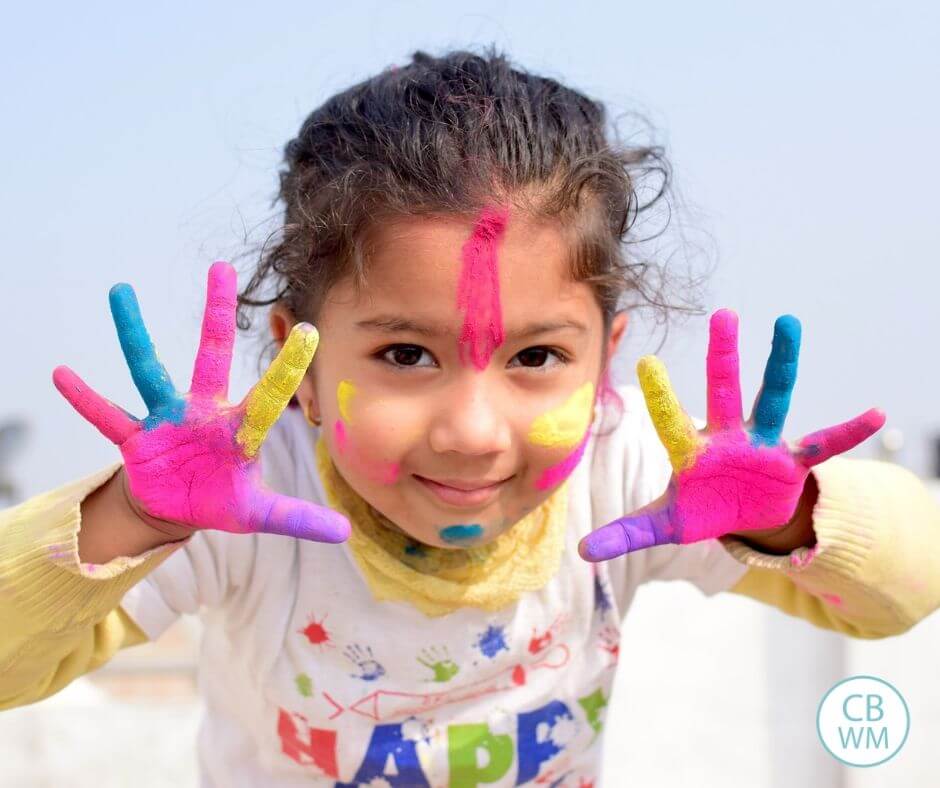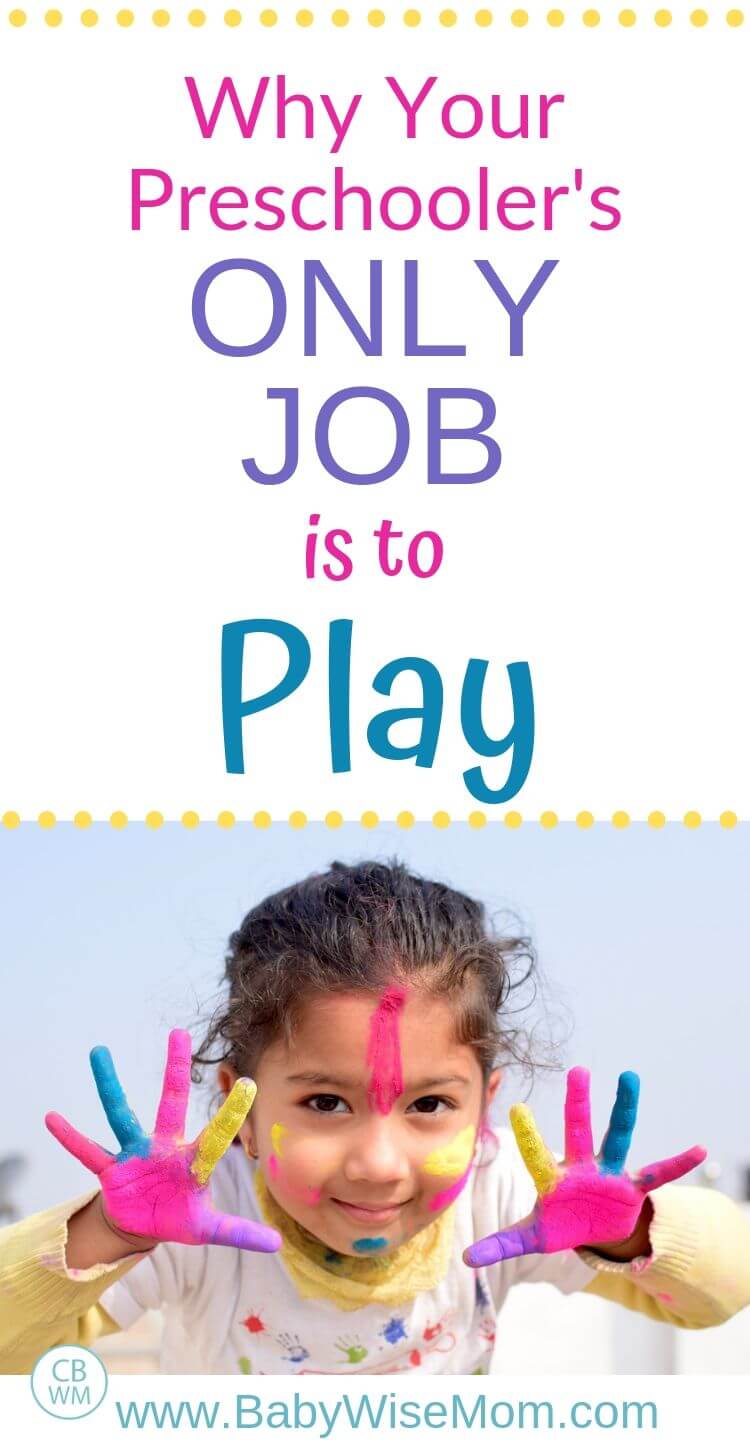It is tempting to fill your preschooler’s day with lessons and organizes sports, but read this post to see why your preschooler’s focus should be play.

A child’s job is to play. As adults, we might think of play as nothing more than recreational fun, but for a child, it is much more than that.
On Becoming Preschoolwise points out that through play, a child learns:
- problem-solving
- moral skills
- social skills
- improved motor skills
- logic
- reasoning
- strategy (page 16)
That is a lot of skills!
Post Contents
Why Play is So Important
Many parents today worry about the academics and success of their children. They might also want their children to excel musically and/or athletically. Because of this, parents start flash cards with a baby and music lessons as a toddler.
You can see preschoolers running up and down the soccer field with overzealous coaches and parents screaming from the sidelines. It has been my observation that more people show up to support a four year old in a sporting event than a 14 year old.
But as we fill our little one’s time with the learning and lessons, we lose out on play.
Your child learns all of the skills listed above through play. “Play is not simply an activity that a child wants to absorb himself in, but a necessary framework of understanding his world” (page 27).
Read: The Importance of Free Playtime (and ideas for fitting it in)
Do Not Overbook Your Little One
You don’t need to overbook your child into formal learning organizations. Your three year old would likely learn more about T-ball if his parents played with him in the backyard than throwing him into a situation with a couple of dozen other three-year-olds who don’t know what they are doing.
I am not saying organized sports or lessons are inherently bad. If you follow us closely, you quickly see we love and participate in sports and lessons of all types.
There is a time and season for them.
But this isn’t a post on that. This is about play.
The point here is to not overlook the value of play. Overbooking your child denies him the opportunity to play since he is so busy running from lesson, to practice, to games, to recitals…the list goes on.
Do not be so consumed with helping your child to excel through organized sports and lessons that your child misses out on the skills that would be developed through play.
Do Not Allow Too Much Screen Time
The other end of the spectrum is allowing your child to engage in too much absorption activities like television. This is not play.
I don’t think television is a necessary part of life. I also don’t personally think it is inherently bad. I allow my children TV time each day when they are young (once they get into school and it is the school year, we do not have screen time each day).
I monitor what they watch. I love shows like Super Why! and other shows on PBS that actually provide some educational value along with the entertainment. Some learning can happen through screens, but keep in mind that children learn through actual play. So be wary that you do not allow so much screen time in your child’s day that play cannot happen.

Play Helps You Realize Strengths and Weaknesses
Preschoolwise also points out that play reveals strengths and weaknesses of your child. You can observe your child’s moral strengths and weaknesses as you play a board game with him. Does he follow the rules? How does he handle losing? How about winning? Will he play a second time even if he loses?
I have found playing games with Brayden very interesting. I am a competitive person by nature, as is my husband. I try to keep that at bay (which is difficult) while playing with Brayden. At first, I realized I took it too far. I let him win all the time. I try to find a balance between playing to win and letting him win. He needs to experience that others win sometimes, too.
Once Brayden started to get competitive, he would have a happy dance that included a song to the effect of “I win! I win!” Well, that might not hurt my feelings at all, but if he were to do that to a child his age, it likely would. It isn’t fun to have your loss rubbed in your face. This is something that is difficult to explain to a three year old, but over time, he has gotten it.
He also didn’t enjoy losing. He would be sad and tell me he didn’t want to lose. I replied that I knew. People don’t want to lose. But not everyone wins. Over time, we were able to build up to an attitude of happiness just to be playing. We congratulated each other when things were going well. When things didn’t go well for ourselves, we shrugged our shoulders and still had fun playing.
Most board games for children are completely left up to chance. Candyland is a good example. There are still things you can do in Candyland to make it hard on yourself and easy on your child. One example might be to require yourself to go back to the candy cane after you have passed the peanut, but not require that of your child. Take wisdom in how you approach these games. It isn’t good to always let your child win, but you don’t always want to “smoke” your kid either.
Structured Play Is Okay, Too
Free play is valuable and important in your child’s day. That does not mean ALL play needs to be free play. You can balance out time spent with structured play, also.
Naturally, you will want some formal learning time with your preschooler each day. “Not all education comes in the form of play” (page 27). You will need to teach sitting and focusing skills. You will need to teach your child to concentrate on the task at hand.
You will need to give opportunities for your child to listen and follow instructions. Through play, you can observe your child’s strengths and weaknesses and work on the weaknesses during formal learning time.
If your child is younger, knowing the importance and value of play can give you added incentive to incorporate independent playtime into your child’s day. You will also want to allow free playtime and other structured playtime as your child grows.
Conclusion
Playing is not a waste of time, and the ability of a child to play on his own teaches many wonderful skills. Children need to play, so be sure that each day you provide time for it. It is not time wasted, but time well spent.


Yay! Our two year old LOVES Super Why! Great post:)
Isn't SuperWhy great? The other day, at the beginning of the show when they are introducing themselves, Brayden said, "Brayden! With power to save the world!" lol.